Kekkei's Content - Page 8 - InviteHawk - Your Only Source for Free Torrent Invites
Buy, Sell, Trade or Find Free Torrent Invites for Private Torrent Trackers Such As redacted, blutopia, losslessclub, femdomcult, filelist, Chdbits, Uhdbits, empornium, iptorrents, hdbits, gazellegames, animebytes, privatehd, myspleen, torrentleech, morethantv, bibliotik, alpharatio, blady, passthepopcorn, brokenstones, pornbay, cgpeers, cinemageddon, broadcasthenet, learnbits, torrentseeds, beyondhd, cinemaz, u2.dmhy, Karagarga, PTerclub, Nyaa.si, Polishtracker etc.

Kekkei
-
Posts
303 -
Joined
-
Last visited
-
Days Won
1 -
Feedback
0% -
Points
21,725 [ Donate ]
Content Type
Raffles
Profiles
Forums
Applications
Official Store
Posts posted by Kekkei
-
-
Chrome and Firefox are again blocking direct access to The Pirate Bay's download pages. According to Google's safe browsing program, ThePirateBay.org is a "deceptive site" that may steal user information. The TPB crew has been alerted to the issue and hope it will be resolved soon.
 Millions of Pirate Bay users are currently unable to access the torrent detail pages on the site without receiving a stark warning.
Millions of Pirate Bay users are currently unable to access the torrent detail pages on the site without receiving a stark warning.
Over the past few hours Chrome and Firefox have started to block access to ThePirateBay.org due to reported security issues.
The homepage and various categories can be reached without problems, but when visitors navigate to a download page they are presented with an ominous red warning banner.
“Deceptive site ahead: Attackers on Thepiratebay.org may trick you into doing something dangerous like installing software or revealing your personal information,” it reads.
“Google Safe Browsing recently detected phishing on thepiratebay.org. Phishing sites pretend to be other websites to trick you,” the Chrome warning adds.
Chrome’s latest Pirate Bay warning
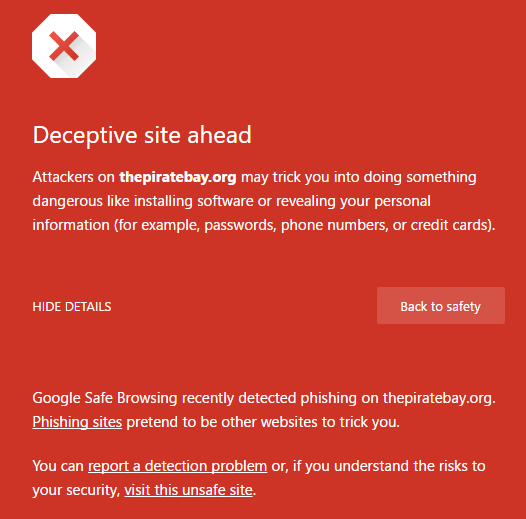
Firefox is showing a similar error message, as do all applications and services that use Google’s safe browsing database, which currently lists TPB as “partially dangerous.”
According to Google the notorious torrent site is linked to a phishing effort, where malicious actors try to steal the personal information of visitors.
It’s likely that the security error is caused by a malicious third-party advertisement. The TPB team informs TorrentFreak that they are aware of the issue, which they hope will be resolved soon.
This is not the first time that The Pirate Bay has been flagged by Google’s safe browsing filter. The same happened just a month ago, when the site was accused of spreading “harmful programs.” That warning eventually disappeared after a few days.
By now, most Chrome and Firefox users should be familiar with these intermittent warning notices. Those who are in a gutsy mood can simply “ignore the warning” or take steps (Chrome, FF) to bypass the blocks permanently.
https://torrentfreak.com/chrome-and-firefox-brand-the-pirate-bay-as-a-phishing-site-again-161006/
-
Advertising network JuicyAds has scored an early victory at a California federal court. In a tentative ruling, District Court Judge George Wu says he will grant a motion to dismiss the complaint from adult entertainment publisher ALS Scan. This would mean that the advertiser is not liable for the infringements of any pirate sites it does business with.
 Increasingly, copyright holders have been urging third party services to cut their ties with pirate sites.
Increasingly, copyright holders have been urging third party services to cut their ties with pirate sites.
Hosting providers, search engines, ISPs, domain name registrars and advertisers should all do more to counter online piracy, the argument goes.
This summer adult entertainment publisher ALS Scan took the matter beyond the asking stage.
The company filed a complaint at a California federal court, targeting CloudFlare and the advertising network JuicyAds over image copyright infringement carried out by their users.
The case could set an important precedent for the entire advertising industry. However, according to a tentative ruling (pdf) issued by District Court Judge George Wu this week, they have little to worry about for now.
After reviewing the first amended complaint (FAC), he concludes that there is no evidence that JuicyAds is liable for contributory copyright infringement. The complaint lists no evidence showing that JuicyAds’ parent company Tiger intentionally encouraged infringing acts, as the defense had argued.
“The Court would agree that the FAC fails to plausibly allege a link between Tiger’s advertising brokerage services and the infringing conduct of the Publishers,” Judge Wu writes, citing a similar case between Perfect 10 and Visa.
“It is entirely unclear from the FAC how serving an advertisement on a website encourages infringement, other than by enabling the website to profit from those advertisements, a theory the Ninth Circuit expressly rejected in Visa.”
The inducement aspect of contributory infringement fails as well. Based on the current complaint there is no evidence that JuicyAds actively promoted or encouraged any infringing acts.
“Here, the FAC does not allege that JuicyAds provides its advertising brokerage service for the purpose of promoting copyright infringement, or that it has directly encouraged Publishers to display infringing content on their websites.”
On the issue of vicarious copyright infringement the Judge also sided with the defense. The adult entertainment publisher failed to show that Juicyads can control the websites of their clients or that it has a direct financial interest in the infringing activity.
Judge Wu again cites the Visa case where it was held that the defendant did not have the ability to remove pirate websites from the Internet or block the distribution of infringing images on third party sites.
Finally, the remaining claims of unfair competition and contributory trademark infringement proved to be insufficient too, awarding a clear win to Juicyads.
The present ruling is only tentative. This means that ALS Scan still has the opportunity to argue against it during a scheduled hearing. If they don’t, the ruling becomes final.
For now, however, JuicyAds’ legal team is quite pleased with the decision.
“The defense team views this decision as a victory for both JuicyAds and for the online advertising industry,” JuicyAds’ lawyer Lawrence Walters told Xbiz in a comment.
“Unchecked efforts to hold distant online service providers responsible for indirect copyright infringement has the potential to stifle innovation,” he adds.
CDN provider CloudFlare has also submitted a motion to dismiss the complaint. This is still under review and Judge Wu is expected to issue a ruling during the weeks to come.
https://torrentfreak.com/u-s-judge-advertiser-is-not-liable-for-pirate-sites-161005/
-
A California federal court has thrown up a roadblock for filmmakers who want to obtain the personal details of an alleged BitTorrent pirate. The judge refused to issue a subpoena, twice, because it's not clear if the rightsholder obtained the geolocation details at the time of the infringement or after the fact.
 While relatively underreported, many U.S. district courts are still swamped with lawsuits against alleged film pirates.
While relatively underreported, many U.S. district courts are still swamped with lawsuits against alleged film pirates.
The copyright holders who initiate these cases generally rely on an IP address as evidence. This information is collected from BitTorrent swarms and linked to a geographical location using geolocation tools.
With this information in hand, they then ask the courts to grant a subpoena, forcing Internet providers to hand over the personal details of the associated account holder.
In most cases, courts sign off on these subpoenas quite easily, but in a recent case California Magistrate Judge Mitchell Dembin decided to ask for further clarification and additional evidence.
The case in question was filed by Criminal Productions, the makers of the 2016 movie Criminal, who are linked to the well-known pirate chasers Nu Image and Millennium Films.
The movie makers filed a complaint against a “John Doe” and list an IP-address that, according to a geolocation lookup, is linked to a location in San Diego County.
Magistrate Judge Mitchell Dembin, however, is not ready to issue a subpoena based on that information alone. Specifically, he notes that the complaint lacks details on when the geolocation effort was performed.
If the copyright holder looked up the IP-address information after the infringements the location and ISP info may not be accurate at all, as the assignment may have changed.
“It is most likely that the subscriber is a residential user and the IP address assigned by the ISP is ‘dynamic’. Consequently, it matters when the geolocation was performed,” Judge Dembin writes (pdf).
“If performed in temporal proximity to the offending downloads, the geolocation may be probative of the physical location of the subscriber. If not, less so, potentially to the point of irrelevance,” he adds.
This clarification is indeed important but has never been made before in court, as far as we know.
In the original request, Criminal Productions only writes that the geolocation data was obtained prior to filing the lawsuit, but it’s not clear whether that was at the time of the infringements, which took place several months ago.
“This is not good enough. As much as four months may have passed between the alleged infringement and the geolocation,” Judge Dembin writes.
“Plaintiff must provide the date that geolocation occurred and, if performed closer to the filing date, must provide further support and argument regarding the probative value of the geolocation.”
Based on the missing information the motion for discovery was denied, meaning that Criminal Productions didn’t get the subpoena they were after.
A few days after this denial the filmmakers submitted an amended request providing additional information. However, it was still unclear when the geolocation information was actually obtained, so the Judge denied it again yesterday (pdf).
Denied again
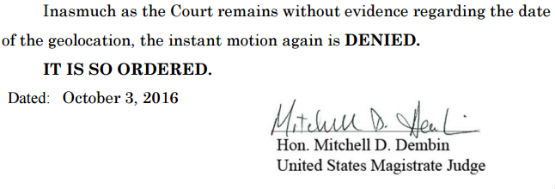
The issue raised in this case is interesting from an accuracy standpoint. Copyright holders in these cases always link an IP-address to a location and ISP, if only to show that the case was filed in the right district. However, they usually don’t say when this geolocation data was obtained.
ISPs do of course keep a log of the IP-address assignment changes. However, the right jurisdiction has to be established before a subpoena is issued.
Judge Dembin therefore suggests that rightsholders should get the information at the time of the infringement, which may be easier said than done. Geolocation databases are far from perfect and most are not updated instantly.
This is something the residents of a Kansas farm know all too well, as their house is the default location of 600 million IP-addresses, which causes them quite a bit of trouble.
Just last month EFF released a whitepaper urging courts to take caution when processing IP-address information. Whether Judge Dembin has read this is unknown, but his actions are definitely in line with the paper’s findings.
-
1 hour ago, agudzub said:It is necessary invitation code ...
Signups are open on the 2nd of every month
-
Dutch anti-piracy group BREIN says it has discovered the identities of people running several pirate linking sites. Of interest in the case is that the identities were obtained from a UK-based hosting provider, which complied with BREIN's requests without receiving a court order.
 One of the main problems faced by anti-piracy outfits is identifying their adversaries. Pirates of all kinds value anonymity and many go to great lengths to protect it.
One of the main problems faced by anti-piracy outfits is identifying their adversaries. Pirates of all kinds value anonymity and many go to great lengths to protect it.
When it comes finding out the personal details of a pirate, whether that’s the user of a regular consumer-level ISP or the operator of a large torrent or linking site, the usual method is via court order.
Such orders are obtained in a variety of ways, but it usually involves presenting evidence and having a judge compel a provider to hand over whatever details it has on file. This happens in at least hundreds of cases every year.
Of current interest is a report from anti-piracy outfit BREIN. The Dutch-based operation says it’s investigating three as-yet-unnamed linking sites that have been distributing large quantities of popular movies and TV shows hosted on a cyberlocker.
BREIN has been trying to uncover the identities of the people behind the sites since this makes it much easier to ramp up the pressure. Indeed, once their names are known, some site operators have a tendency to throw in the towel.
The first stage of this process was fairly straightforward since the pirates were using servers belonging to a local hosting provider. This gave BREIN a nice start to its investigation and it’s all thanks to case law established more than a decade ago.
In 2003, stamp dealer and lawyer Augustinus Pessers was wrongfully accused of fraud by an individual posting on a website operated by Internet service provider Lycos. Pessers began legal action, demanding that the allegations be taken down. He also wanted to force Lycos to hand over the name and address of the poster making the allegations.
After two years of litigation and against a defense mounted by Lycos, in November 2005 the Dutch Supreme Court ruled that Lycos must hand over the personal details of the user to Pessers. The stamp dealer had won and outfits such as BREIN received a welcome boost.
Armed with this case law, BREIN found that the servers used by the pirate sites in their current investigation were Dutch-based, at hosting company Serverius. Under the Pessers ruling the company would have to comply with a disclosure request. However, those servers were actually operated by another company based overseas.
3NT Solutions is a UK-based hosting provider owned by companies in Belize and Panama. According to BREIN, 3NT handed over the personal details of the pirate sites it was hosting at Serverius, without a court order.
“These details consist of name, address, e-mail address and payment details. 3NT also ceased its hosting services to the illegal sites at issue,” BREIN says.
Normally when anti-piracy companies want to find out the identities of an ISP’s customers in the UK, they obtain a court order known as a Norwich Pharmacal Order. In this case, BREIN says that wasn’t needed, since 3NT had servers in the Netherlands.
“Both Serverius as well as 3NT have a legal responsibility to assist in curtailing piracy. Simply being based – or registered – in another country than where the servers are, does not mean one can escape that responsibility,” BREIN chief Tim Kuik informs TorrentFreak.
Kuik says that both Serverius and 3NT were “reluctant to abide by their responsibilities” but they also know that BREIN would sue them if they didn’t comply and would likely lose the case and end up losing money.
“Under Dutch case law – based on EU rules – intermediaries are obliged to provide identifying details voluntarily upon request in case of infringement and damage, and the interests of the injured party prevails,” Kuik adds.
“In the Netherlands, it is a regular occurrence for BREIN that identifying details are provided by intermediaries voluntarily upon request. Court cases are exceptional,” he concludes.
BREIN say that more and more companies outside the Netherlands, include Google recently, have been following these disclosure rules.
Meanwhile, Kuik and his colleagues say that with personal details in hand they will continue their quest against the operators of the pirate sites in question, and the cyberlocker they were using.
3NT did not immediately respond to TorrentFreak’s requests for comment.
https://torrentfreak.com/brein-unmasks-overseas-pirates-without-a-court-order-161004/
-
Today we bring you the next episode of the Steal This Show podcast, discussing the latest file-sharing and copyright trends and news. In this episode we talk to Jim Munroe, science fiction author, film director and games designer.
 Jim Munroe is a Canadian science fiction author, film director and games designer. He publishes his work independently under the imprint No Media Kings.
Jim Munroe is a Canadian science fiction author, film director and games designer. He publishes his work independently under the imprint No Media Kings.
Join us as we discuss why an ex-Sony exec loves piracy and if that marks the end of the cool pirate.
In addition we talk about why Millennials won’t pay for content or watch adverts, and how to make them love creators; and how your operating system can be used to operate YOU – and not just by stopping you from pirating.
Finally Jim discusses his new interactive fiction creation softwareTexture (try it! it’s free!), and his virtual reality sci-fi series Haphead, offering some great tips for creators looking to keep their heads in our dirty, digital world.
—
Steal This Show aims to release bi-weekly episodes featuring insiders discussing copyright and file-sharing news. It complements our regular reporting by adding more room for opinion, commentary and analysis.
The guests for our news discussions will vary and we’ll aim to introduce voices from different backgrounds and persuasions. In addition to news, STS will also produce features interviewing some of the great innovators and minds.
-
-
-
Internet provider Cox Communications is demanding over $100,000 in compensation from Round Hill Music, for the legal fees it incurred based on false copyright claims. The music group sued Cox last year over alleged infringements committed by the ISP's subscribers, without actually owning any of the copyrights in question.
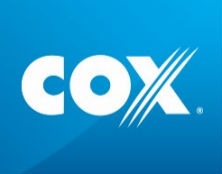 Last December a Virginia federal jury ruled that Internet provider Cox Communications was responsible for the copyright infringements of its subscribers.
Last December a Virginia federal jury ruled that Internet provider Cox Communications was responsible for the copyright infringements of its subscribers.
The ISP was found guilty of willful contributory copyright infringement and ordered to pay music publisher BMG Rights Management $25 million in damages.
The verdict was a massive victory for the music company and a disaster for Cox, who quickly appealed.
What has been largely overseen, however, is that BMG was not the only music outfit that sued the Internet provider in this case. The initial complaint also listed Round Hill Music as a second plaintiff.
Interestingly, Round Hill’s claims were dismissed a few weeks before the final verdict came in. Based on evidence highlighted by Cox, the court concluded that the music outfit didn’t own the copyrights for the songs it was suing over, so it had no standing in the case.
No copyright, last year’s order

While Cox was pleased with the ruling, it wasn’t happy with the hundreds of hours its legal team spent countering the false copyright claims. For this reason, it now hopes to be compensated for the tens of thousands of dollars in legal costs.
In a motion for attorney’s fees and costs (pdf) filed at Virginia federal court late last week, Cox Communications writes that Round Hill had a losing case to begin with.
“Round Hill’s case against Cox was unreasonable from start to finish: it brought claims of copyright infringement without owning any copyrights, and it continued to pursue those claims aggressively even after Cox exposed the obvious defect on this threshold issue.”
Only exclusive rightsholders are entitled to file a copyright infringement. According to Cox, Round Hill Music intentionally tried to hide their shortcomings, hoping to win millions in damages.
However, their plan failed and now the ISP is the one asking the court for compensation.
“Round Hill’s repeated obfuscation of the facts, and the continued and aggressive pursuit of those claims after their falsehood was apparent, warrant an award to Cox of the fees Cox incurred defending against those claims,” Cox writes.
“Cox invested considerable time and effort in discovery pinning down Round Hill’s elusive and false ownership claims,” they add.
When awarding legal fees and costs, an important aspect courts have to review is the “degree of success” of the prevailing defendant. In this lawsuit there should be little doubt about the outcome.
“Cox prevailed completely over Round Hill. The Court’s ruling on Round Hill’s ownership disposed of all of its claims against Cox: the Court found that ‘Round Hill Music LP cannot proceed in this action and its claims for infringement against Cox are dismissed’,” the ISP writes.
After adding up over 300 hours of attorney and paralegal work, Cox requests an award of $71,835 as well as an additional $35,000 for hours spent on the current motion and future replies.
If the court agrees, that means Cox finally has something small to celebrate in this case. However, at the same time there’s also more trouble looming on the horizon.
Cox is not the only party in the case to submit a motion for attorney’s fees and costs. BMG did exactly the same and their tab is significantly higher, totalling more than $13 million, which is quite a scary prospect.
During the coming weeks the court will review both requests, as well as the various opposition and reply brief that will undoubtedly be filed.
https://torrentfreak.com/cox-wants-music-group-to-pay-for-false-copyright-claims-161003/
-
-
This week BitTorrent Inc. announced a brand new feature for its uTorrent and BitTorrent clients. By enforcing a 2:1 sharing ratio, Altruistic Mode appears to be designed for the file-sharer who really wants to give back to the community. However, even among the real sharing enthusiasts, we can't find a single user who wants to use it.
 In general terms, torrent clients haven’t undergone much development in the past several years. They essentially do what they did a decade ago, albeit with a number of additional bells and whistles.
In general terms, torrent clients haven’t undergone much development in the past several years. They essentially do what they did a decade ago, albeit with a number of additional bells and whistles.
So, this week, when BitTorrent Inc announced a new feature for its uTorrent and BitTorrent clients, it was time to sit up and take notice. Especially since the news was delivered by none other than the inventor of BitTorrent, Bram Cohen.
The announcement centered around Altruistic Mode, an option buried away in the clients’ preferences that ensures that the downloader who enables it always maintains a share ratio of 2:1. In other words, if they download 1GB, their upload will be perfectly synced to have uploaded 2GB when that point is reached.
For those who take the time to read it, Cohen’s explanation of how it works is crystal clear. However, despite the good intentions, we can’t find a single person who thinks it’s a good idea.
“What is the point of this ‘innovation’?” one reader asked TorrentFreak. “If I want to share 2:1 I just seed for that long. I’m always seeding 6:1 or more anyway so i’ll never use it.”
Another offered a settings solution.
“About the ‘Altruistic Mode’ in µTorrent: Right-click the torrent you want seeded to a 2:1 ratio > Properties > Seeding Goal: Override Default Settings: 200 (%) > OK. Takes less than 10 seconds,” he wrote.
“What might have been useful is an overall setting ‘Seed every torrent to nnn%’ in Options > Preferences > Bandwidth, a setting that could be overridden in the Properties of a particular torrent for a different ratio.”
However, as Cohen explains in his piece, seeding for longer isn’talways the answer to achieving a perfect 2:1 ratio. That being said, people simply can’t see why they need the feature, with others pointing out how it could even be self-defeating
“Ironically, for this ‘mode’ to work it requires leeches. Seems like a bad idea to me,” says TF reader Salem Lowe.
“If everyone successfully seeded 2:1, wouldn’t everyone would need to download [the torrent] twice?” questioned Zoflo.
“Correct,” Gentox replied.
Of course, this situation would only arise if everyone in a swarm had the feature switched on, which given the reception so far seems ridiculously unlikely, particularly given Cohen’s warning that those with the feature enabled may find that their torrents never complete.
And here’s the problem. The only torrent users that are likely to want to be as altruistic as this feature envisions are those that seed heavily anyway. However, it seems that this mode only encourages people to sit in a torrent while being restricted by what they can upload, potentially without even having the whole file.
Without the whole file, true seeding can’t take place and to the hardcore sharer, that’s a bizarre concept. It’s also why Altruistic Mode probably won’t be a success, particularly when torrent etiquette can already achieve the end goals – plenty of well-seeded content.
“The only thing [the mode] will produce are a bunch of smug people bragging about how they are altruistic seeders,” says TF reader Nighter3D.
“Just download the file as fast as possible and then keep seeding for as long as possible. You will still get a good ratio and because you got the entire file you reduce the risk of it becoming incomplete-able for others.”
https://torrentfreak.com/utorrents-new-altruistic-mode-baffles-enthusiastic-file-sharers-161002/
-
Google is coping with a continuous increase of takedown requests from copyright holders who are targeting pirate sites in its search results. The company currently processes a record-breaking 24 million links to "pirate" pages per week, which is more than double the amount it received around the same time last year.
 In recent years copyright holders have bombarded Google with DMCA takedown notices, targeting links to pirated content.
In recent years copyright holders have bombarded Google with DMCA takedown notices, targeting links to pirated content.
These requests have increased dramatically over the years, breaking record after record.
Five years ago the search engine received ‘only’ ten million takedown notices during the entire year, but today it processes the same amount in less than three days.
Data gathered by TorrentFreak from Google’s Transparency Reportreveals a new weekly record of 24,119,797 reported pirate links, which is more than twice the number received by Google last year.
The graph below nicely illustrates the continued increase, showing the number of weekly requests over the most recent years.
At the current rate, Google will process more than a billion links in 2016, which would be a hundredfold increase in just five years, with no slowdown in sight.
Reported ‘pirate’ links

Considering our frequent reporting about various takedown related mistakes, it’s worth looking at how many of these reported links actually disappear from search results.
New data made public earlier this month showed that the majority of the links, 91 percent, are ultimately removed. Two percent of the reported URLs are rejected, with the remainder being duplicate or incomplete links.
While rightsholders have increased their takedown efforts over the years, the major entertainment industry groups are not happy with the current state of Google’s takedown process at all.
One of the main complaints has been that content which Google de-lists often reappears under new URLs.
“Every day we have to send new notices to take down the very same links to illegal content we took down the day before. It’s like ‘Groundhog Day’ for takedowns,” RIAA CEO Cary Sherman said previously.
To counter this, rightsholders would like Google to ensure that content “stays down” while blocking the most notorious pirate sites from search results entirely.
Google, however, believes that this will lead to all sorts of problems and maintains that the current system is working as the DMCA was intended.
The search engine did implement various other initiatives to counter piracy, including the downranking of pirate sites and promoting legal options in search results, which it recently detailed in its updated “How Google Fights Piracy” report.
For now the impasse continues and whether it will ever be broken is highly doubtful.
https://torrentfreak.com/google-piracy-takedown-requests-double-year-161002/
-
-
-
-
This week a huge coalition of recording labels headed by the RIAA, IFPI, and BPI, sued YouTube ripping service YouTube-MP3. Today we take a closer look at the lawsuit which was filed against a German company, owned and operated by a German citizen, which could seek damages running into the hundreds of millions of dollars.
 A couple of weeks ago, the IFPI announced that the problem of stream-ripping has become so serious that in volume terms it has overtaken downloading from ‘pirate’ sites. For what is essentially a YouTube-powered phenomenon, that was quite a claim.
A couple of weeks ago, the IFPI announced that the problem of stream-ripping has become so serious that in volume terms it has overtaken downloading from ‘pirate’ sites. For what is essentially a YouTube-powered phenomenon, that was quite a claim.
When the labels publish this kind of information, they usually have an end game in mind. So, thinking ahead, we contacted Philip Matesanz, the usually responsive operator of YouTube-MP3, the world’s largest ripping site. We asked if the labels had been in contact with him. We received no response and the alarm bells began ringing.
This week, all became clear. UMG Recordings, Capitol Records, Warner Bros, Sony Music, Arista Records, Atlantic Records and several others, sued Matesanz and his company PMD Technologie, claiming that his ripping of tracks from YouTube infringed their rights. Today we take a closer look at their lawsuit.
Jurisdiction
Those familiar with YouTube-MP3 will recall that the site is based in Germany and therefore operates under local law. However, the labels have chosen to sue Matesanz and his company in the United States under US law.
They state that their claims arise under federal copyright law and that is appropriate since YouTube-MP3 is “dedicated exclusively to capturing, converting, and copying audio content that is maintained on a U.S.-based website, YouTube.com.”
The labels say that after ripping the content from YouTube, YouTube-MP3 then distributes that content to users in the United States, noting that the site has more users from the US than any other country.
It is worth noting that unlike the Kim Dotcom/Megaupload case, there appears to be no criminal action against YouTube-MP3, only civil litigation.
The allegations against YouTube-MP3
The labels claim that YouTube-MP3 was designed and exists for one reason – to profit from the unauthorized reproduction of their copyrighted music. In carrying this out, the labels say that YouTube-MP3 breaches copyright law in a number of ways.
Direct Copyright Infringement: The labels allege that after ripping content from YouTube, YouTube-MP3 stores the resulting MP3s on its servers in order to service subsequent users more efficiently. This, they say, amounts to the site carrying an illegal library of their content and distributing it in the United States.
Contributory Copyright Infringement: With the allegations of direct infringement in mind, the labels say that YouTube-MP3 has “actual and constructive knowledge” that its users are also committing infringement when they rip content and have it delivered to their machines. Therefore, YouTube-MP3 is liable for user infringements too and at $150,000 per shot, that could get insanely expensive.
Vicarious Copyright Infringement: “Defendants have the right and ability to supervise and control the infringing activities that occur through the use of YTMP3, and at all relevant times have derived a direct financial benefit from the infringement of Plaintiffs’ copyrights. Defendants are therefore vicariously liable for the infringement of Plaintiffs’ copyrighted sound recordings,” the lawsuit reads.
Inducement of Copyright Infringement: Simply put, the labels claim that by providing the ripping and downloading service, YouTube-MP3 encouraged, promoted and assisted the direct infringements of its users. As a result, the site is liable for their actions.
Circumvention of Technological Measures: The labels say that YouTube has technical measures in place to prevent users from downloading music from the site. These are bypassed by YouTube-MP3 in breach of copyright law.
“YTMP3 service circumvents technological measures that YouTube has implemented to effectively control access to and prevent copying of works protected under the Copyright Act, in violation of 17 U.S.C. § 1201(a). More specifically, Defendants’ service descrambles a scrambled work, decrypts an encrypted work, or otherwise avoids, bypasses, removes, deactivates, or impairs a technological measure without the authority of Plaintiffs or YouTube.”
While not as much as the $150,000 in statutory damages available for each instance of willful infringement, circumvention can get expensive too. In this respect, the labels are looking for $2,500 for each act of circumvention and with a reported 60 million visitors each month, there are countless millions of those.
Conclusion
There can be little doubt that given the importance the labels are now placing on stream-ripping, this case against YouTube-MP3 will be vigorously pursued to its conclusion. Whether it will progress to a full trial will remain to be seen but one has to think that barring an extraordinarily spirited Kim Dotcom-style defense, this one is unlikely to end well for YouTube-MP3.
https://torrentfreak.com/a-closer-look-at-the-riaa-lawsuit-against-youtube-mp3-161001/
-
This week the European Court of Justice heard a crucial case that will give more clarity on the infringing nature of unauthorized streaming. Dutch anti-piracy group BREIN and the Spanish authorities argued that offering or watching pirate streams is a violation of the EU Copyright Directive. However, the European Commission believes that consumers who watch unauthorized streams are not breaking the law.
 Online streaming continues to gain in popularity, both from authorized and pirate sources.
Online streaming continues to gain in popularity, both from authorized and pirate sources.
Unlike traditional forms of downloading, however, in many countries the legality of viewing unauthorized streams remains unclear.
In the European Union this may change in the near future. This week the European Court of Justice held a hearing during which it reviewed several questions related to pirate streaming.
The questions were raised in a case between Dutch anti-piracy group BREIN and the Filmspeler.nl store, which sells “piracy configured” media players. While these devices don’t ‘host’ any infringing content, they ship with add-ons that make it very easy to watch infringing content.
The Dutch District Court previously referred the case to the EU Court of Justice, where several questions were discussed in a hearing this week. In addition to BREIN and Filmspeler, the European commission and Spain weighed in on the issue as well.
The first main question that the Court will try to answer is rather specific. It asks whether selling pre-programmed media-players with links to pirate sources, through add-ons for example, are permitted.
Not surprisingly, Filmspeler.nl believes that it should be allowed. They argued that there is no communication to the public or a crucial intervention from their side, since these pirate add-ons are already publicly available.
The European Commission doesn’t classify selling pre-loaded boxes as infringing either, and notes that rightholders have other options to go after intermediaries, such as blocking requests.
BREIN, which covered the hearing in detail, countered this argument noting that Filmspeler willingly provides access to illegal content for profit. Spain sided with BREIN and argued that willingly including pirate plugins should not be allowed.
The second question is more crucial for the general public as it asks whether it is illegal for consumers to stream pirated content from websites or services.
“Is it lawful under EU law to temporarily reproduce content through streaming if the content originates from a third-party website where it’s made available without permission?”
Spain argued that streaming pirated content should not be allowed in any way. BREIN agreed with this position and argued that streaming should be on par with unauthorized downloading, which is illegal under EU case law.
Interestingly, the European Commission doesn’t believe that consumers who watch pirate streams are infringing. From the user’s perspective they equate streaming to watching, which is legitimate.
Based on the hearing the Advocate General will issue a recommendation later this year, which will be followed by a final verdict from the EU Court of Justice somewhere early 2017.
https://torrentfreak.com/watching-pirate-streams-isnt-illegal-eu-commission-argues-161001/
-
A popular YouTuber is experimenting with torrent-based technology in order to take control of his content and avoid third-party censorship. Bluedrake says that the potential for freedom when using WebTorrent "blows his mind" and has already carried out tests to get the project underway.
 When discussing the most influential websites on the planet, there can be little doubt that YouTube is a true giant. The video-hosting platform is the second most popular site on the Internet behind its owner’s Google.com
When discussing the most influential websites on the planet, there can be little doubt that YouTube is a true giant. The video-hosting platform is the second most popular site on the Internet behind its owner’s Google.com
YouTube attracts well over a billion visitors every month, with many flocking to the platform to view the original content uploaded by its army of contributors. However, with great power comes great responsibility and for YouTube that means pleasing advertisers.
As a result, YouTube has rules in place over what kind of content can be monetized, something which caused a huge backlash recently.
In a nutshell, if you don’t produce content that is almost entirely “appropriate for all audiences,” (without references to drugs, violence, and sex, for example), your content is at risk of making no money. But YouTube goes further still, by flagging “controversial or sensitive subjects and events, including subjects related to war, political conflicts, natural disasters and tragedies.” Awkward.
Many YouTubers view this refusal to monetize content as a form of censorship but recognize that as long as they’re in bed with the company, they’re going to have to play by its rules. For some, this means assessing alternatives.
Popular YouTuber Connor Hill (Bluedrake42 – 186,600 subscribers) is no stranger to YouTube flagging his videos. As a result, he’s decided to take matters into his own hands by experimenting with WebTorrent.
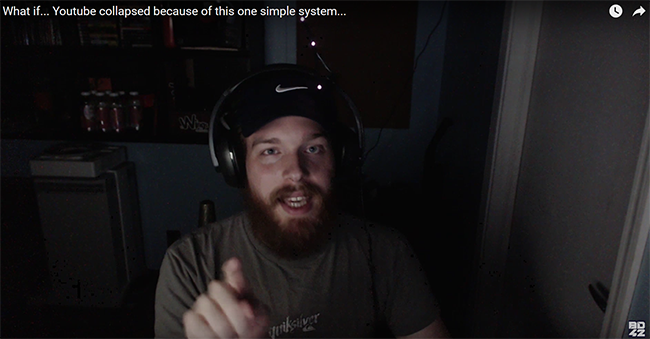
As previously reported, WebTorrent brings torrents to the web. Instead of using standalone applications it allows people to share files directly from their browser, without having to configure or install anything.
Early on, WebTorrent creator Feross Aboukhadijeh identified “people-powered websites” as a revolutionary application for WebTorrent.
“Imagine a video site like YouTube, where visitors help to host the site’s content. The more people that use a WebTorrent-powered website, the faster and more resilient it becomes,” he told TF.
It is exactly this application for the technology that has excited Bluedrake. By taking his content, embedding it in his website, and using his own fans for distribution, Bluedrake says he can take back control.
“This solution does not require torrent clients, this solution does not require torrent files, this is a seamless video-player hosted solution, with a completely decentralized database, supported by the people watching the content itself,” Bluedrake says in a new video. “And it works…REALLY well.
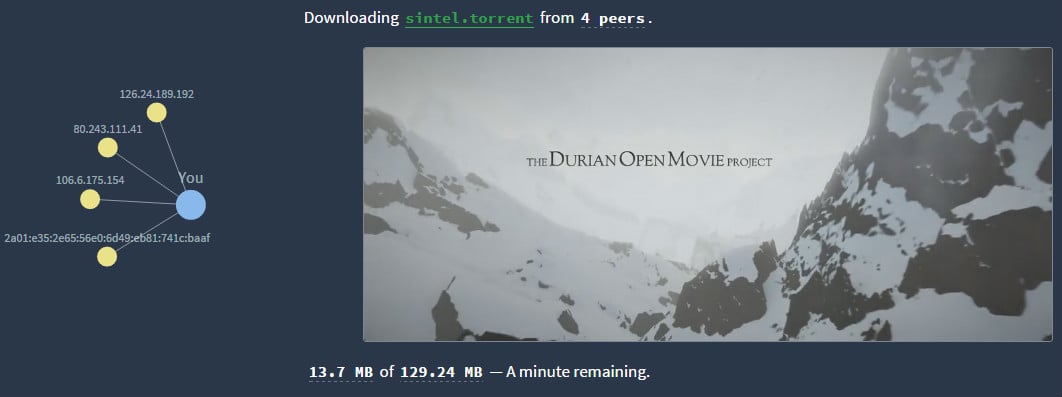
Of course, all torrents need seeds to ensure that older content is always available, so Bluedrake says that the servers already funded by his community will have backup copies of all videos ready to seed, whenever that’s necessary.
“That’s literally the best of both worlds. A CDN and a TVDN – a Torrent Video Distribution Network – at the same time. It will becommunity-funded and community supported…and then we’ll have truly censorship-free, entirely impervious video content, in a network. That gives me chills,” Bluedrake adds.
But while this solution offers the opportunity to avoid censorship, there is no intention to break the law. Bluedrake insists that the freedom of peer-to-peer will only be used for speech, not to infringe copyright.
“All I want is a site where people can say what they want. I want a site where people can operate their business without having somebody else step in and take away their content when they say something they don’t like. We’re going to host our own content distribution network within a peer-to-peer, web-socketed torrent service,” he says.
The development has excited WebTorrent creator Feross Aboukhadijeh.
“This is just one of the extremely creative uses for WebTorrent that I’ve heard about. I’m continually amazed at what WebTorrent users are building with the open source torrent engine,” Feross informs TF.
“When a video site uses WebTorrent, visitors help to host the site’s content. The more people that use a WebTorrent-powered website, the faster and more resilient it becomes. I think that’s pretty cool. It’s something that traditional CDNs cannot offer.
“The magic of WebTorrent is that people can use it however they like. It’s not just a desktop torrent app but it’s a JavaScript library that anyone can use anywhere on the web.”
Of course, one YouTuber using the technology is a modest start but the potential is there for this to get much bigger if Bluedrake can make a success of it.
“The way that we get P2P technology to go mainstream is simple: make it easy, make it better,” Feross says.
“This is part of a larger trend of decentralized protocols replacing centralized services, as we’ve seen with Bitcoin and blockchain apps.”
https://torrentfreak.com/popular-youtuber-experiments-with-webtorrent-to-beat-censorship-160930/
-
Paramount Pictures and CBS Studios have no plans to end their lawsuit against the crowdfunded Star Trek spin-off 'Prelude to Axanar'. Director J. J. Abrams previously announced that the case would be dropped soon. However, paperwork filed in court this week reveals that the movie studios dismiss this claim as an irrelevant third party statement.
 Earlier this year Paramount Pictures and CBS Studios filed a lawsuit against the makers of a Star Trek inspired fan film,accusing them of copyright infringement.
Earlier this year Paramount Pictures and CBS Studios filed a lawsuit against the makers of a Star Trek inspired fan film,accusing them of copyright infringement.
The dispute centers around the well-received short film Star Trek: Prelude to Axanar and the planned follow-up feature film Axanar.
Among other things, the Star Trek rightsholders claim ownership over various Star Trek related settings, characters, species, clothing, colors, shapes, words, short phrases and even the Klingon language.
A few months after the complaint was filed it appeared that the movie studios and the Axanar team had found a way to resolve their issues. During a Star Trek fan event director J.J. Abrams announcedthat the case would be over soon, citing discussions with Star Trek Beyond director Justin Lin.
“We started talking about this realizing that this is not an appropriate way to deal with the fans. The fans should be celebrating this thing,” Abrams said. “So Justin went to the studio and pushed them to stop this lawsuit and now, within the next few weeks, it will be announced this is going away.”
However, as time passed it appears that the director had spoken too soon, or perhaps made up the entire claim ad-lib. The case didn’t “go away” at all and this week it became clear that Paramount and CBS Studios see J.J. Abrams’ comments as irrelevant.
Both parties are currently in the discovery phase where they hope to gather evidence from the other side to back up their claims. Axanar was particularly interested in obtaining any communications the studios had with Justin Lin and J.J. Abrams, which seem to favor their claims.
However, through their lawyers CBS and Paramount refused to hand anything over, noting that this is information is irrelevant, if it exists at all. “We objected to your requests for communications with Justin Lin and J.J. Abrams as irrelevant, and did not agree to produce those documents,” they wrote in an email earlier this month.
The email

To resolve this and other outstanding discovery disputes, the parties now ask the court what information should be handed over, and what can remain confidential.
In the joint motion (pdf) CBS and Paramount reiterate that the comments J.J. Abrams made are “not relevant” to any party’s claim. The directors are not authorized to speak on behalf of the movie studios and their comments have no impact on the damages amount, they argue.
“J.J. Abrams is a producer/director of certain Star Trek Copyrighted Works and Justin Lin was the director of Star Trek Beyond. Neither Mr. Abrams nor Mr. Lin is an authorized representative of either of the Plaintiffs,” the studios claim.
“A third party’s statement about the merits of this lawsuit has absolutely no bearing on the amount of money Defendants’ obtained by their infringing conduct, nor does it bear on any other aspect of damages,” they add.
Axanar disagrees with this assessment. They claim that Abrams statements about dropping the “ridiculous” lawsuit in the interest of fans, is central to a possible fair use claim and damages.
“Statements that Star Trek belongs to all of us and that the lawsuit is ridiculous and was going to be ‘dropped’ is relevant to the impact on the market prong of the fair use analysis, and Plaintiffs utter lack of
damages,” Axanar claims.The court will now have to decide what information CBS and Paramount must share. It’s clear, however, that J.J. Abrams spoke way too soon and that the movie studios are not ready to drop their lawsuit without putting up a fight.
While Abrams may not have realized it at the time, his comments are a blessing for the fan-film. It offers Axanar great leverage in potential settlement discussions and will reflect badly on CBS and Paramount if the case heads to trial.
https://torrentfreak.com/j-j-abrams-cant-stop-copyright-lawsuit-star-trek-fan-film-160930/
-
A man who leaked The Revenant online in advance of its theatrical release has been fined $1.1m. Former studio employee William Kyle Morarity stole copies of the movies while working on a studio lot and uploaded them to private tracker Pass The Popcorn. He also faces eight months’ home detention and 24 months’ probation.
 In December 2015, many so-called ‘screener’ copies of the latest movies leaked online. Among them a near perfect copy of Alejandro G. Iñárritu’s ‘The Revenant’.
In December 2015, many so-called ‘screener’ copies of the latest movies leaked online. Among them a near perfect copy of Alejandro G. Iñárritu’s ‘The Revenant’.
Starring Leonardo DiCaprio and slated for a Christmas day release, in a matter of hours the tale vengeance clocked up tens of thousands of illegal downloads.
With such a high-profile leak, it was inevitable that the authorities would attempt to track down the individual responsible. It didn’t take them long.
Following an FBI investigation, former studio worker William Kyle Morarity was discovered as the culprit. Known online by the username “clutchit,” the 31-year-old had uploaded The Revenant and The Peanuts Movie to private torrent tracker Pass The Popcorn.
The Revenant

Uploading a copyrighted work being prepared for commercial distribution is a felony that carries a maximum penalty of three years in prison, so his sentencing always had the potential to be punishing for the Lancaster man, despite his early guilty plea.
This week Morarity was sentenced in federal court for criminal copyright infringement after admitting screener copies of both movies to the Internet.
After being posted online six days in advance of its theatrical release, it was estimated that The Revenant was downloaded at least a million times during a six week period, costing Twentieth Century Fox Film Corporation to suffer losses of “well over $1 million.”
United States District Court Judge Stephen V. Wilson ordered Morarity to pay $1.12 million in restitution to Twentieth Century Fox. He also sentenced the 31-year-old to eight months’ home detention and 24 months’ probation.
According to court documents, Morarity obtained the screeners and copied them to a portable hard drive. He then uploaded the movies to Pass The Popcorn on December 17 and December 19.
“The film industry creates thousands of jobs in Southern California,” said United States Attorney Eileen M. Decker commenting on the sentencing.
“The defendant’s illegal conduct caused significant harm to the victim movie studio. The fact that the defendant stole these films while working on the lot of a movie studio makes his crime more egregious.”
Deirdre Fike, the Assistant Director in Charge of the FBI’s Los Angeles Field Office, said that Morarity had abused his position of trust to obtain copies of the movies and then used them in a way that caused Fox to incur huge losses.
“The theft of intellectual property – in this case, major motion pictures – discourages creative incentive and affects the average American making ends meet in the entertainment industry,” Fike said.
As part of his punishment, Morarity also agreed to assist the FBI to produce a public service announcement aimed at educating the public about the harms of copyright infringement and the illegal uploading of movies to the Internet.
https://torrentfreak.com/man-leaked-revenant-online-fined-1-1m-160930/
-
New research published by economists from the European Commission shows that online movie piracy significantly hurts sales. However, the effects differ greatly between countries. And in some cases piracy may actually increase revenue due to a sampling effect.
 Research into online piracy comes in all shapes and sizes, often with equally mixed results. The main question is often whether piracy is hurting sales.
Research into online piracy comes in all shapes and sizes, often with equally mixed results. The main question is often whether piracy is hurting sales.
New research conducted by economists from the European Commission’s Directorate-General for Internal Market, Industry, Entrepreneurship and SMEs, tries to find answers for the movie industry.
For a new paper titled “Movie Piracy and Displaced Sales in Europe,” the researchers conducted a large-scale survey among 30,000 respondents from six countries, documenting their movie consumption patterns.
Using statistical models and longitudinal data, they were able to estimate how piracy affects legal sales and if this differs from country to country.
Perhaps unsurprisingly, the findings show that not every pirated movie is a lost sale. Instead, for every hundred films that are first viewed from a pirated source, 37 viewings from paid movies are ‘lost’.
This results in a displacement rate of 0.37, which is still a high number of course, also compared to previous research.
It’s worth noting that in some cases piracy actually has a beneficial effect. This is true for movies that people have seen more than twice.
“Interestingly, we found evidence of a sampling effect: for movies that are seen more than twice, first unpaid consumption slightly increases paid second consumption,” the researchers write.
However, the sampling effect doesn’t outweigh the loss in sales. Overall the researchers estimate that online piracy leads to a significant loss in revenue for the movie industry.
“Using a back-of-the-envelope calculation, we show that this implies that unpaid movie viewings reduced movie sales in Europe by about 4.4% during the sample period,” they write.
This negative effect is driven by a relatively small group of consumers. Roughly 20% of the respondents with the highest movie consumption are responsible for 94% of lost movie sales. Or put differently, the most avid film fans pirate the most.
Interestingly, there are large between-country differences too. In Germany online movie piracy results in ‘only’ a 1.65% loss, this figure is 10.41% for Spain. The UK (2.89%), France (5.73%), Poland (7.21%) and Sweden (7.65%) rank somewhere in between.
According to the researchers, their findings can help policymakers to decide what the best anti-piracy enforcement strategies are. In addition, changes between countries could help to evaluate existing and future measures and inspire future research.
“The estimates that we provide can help policy makers to asses the efficient use of public resources to be spent on copyright enforcement of movies.”
“In particular, since we find that virtually all the lost sales of movies are due to a very small group of individuals, most damages of movie piracy could therefore potentially be prevented with well targeted policies,” the researchers conclude.
https://torrentfreak.com/research-movie-piracy-hurts-sales-but-not-always-160929/
-
The UK's IP Crime Report 2015/16 has just been published, revealing infringement trends gathered from both governmental and private anti-piracy groups. This year in the online piracy sector IPTV/Kodi, torrent sites and stream ripping are seen as the main threats. Meanwhile, the report reveals that pirating Internet subscribers will be receiving warning letters before the end of the year.
For more than a decade the IP Crime Group and the Intellectual Property Office have collaborated to produce an assessment of the level of IP crime in the UK. Their annual IP Crime Report details the responses of businesses, anti-piracy groups, and government agencies.
As usual, this year’s report covers all areas of IP crime, both in the physical realm and online. However, it is the latter area that appears to be causing the most concern to participating anti-piracy groups.
“Perhaps the area where IP crime statistics most often reach jaw-dropping levels is in relation to the industries providing digital content,” the report reads.
“During a sample three-month period last year, 28% of those questioned admitted their music downloads in the UK came from illegal sources. Similarly, 23% of films, 22% of software, 16% of TV and 15% of games were downloaded in breach of copyright.”
While noting that illicit music downloads have actually reduced in recent years, the report highlights areas that aren’t doing so well, TV show consumption for example.
“The reasons for the spike in TV copyright infringement appear to be, in part, technological, with ‘unofficial services’ such as uTorrent, BitTorrent, TV catch up apps and established sources such as YouTube offering content without legal certainty,” it adds.
But while several methods of obtaining free TV content online are highlighted in the report, none achieve as much attention as IPTV. While IPTV comes in several forms, the most common in respect of action in the UK involves devices loaded with the entirely legal Kodi software but augmented with illegal third-party addons.
In her report preamble, Minister for Intellectual Property Baroness Neville-Rolfe describes anti-IPTV collaboration between the Federation Against Copyright Theft, Trading Standards, and the Police, as one of the year’s operational successes. Indeed, FACT say anti-IPTV work is now their top priority.
Federation Against Copyright Theft
“We have prioritised an emerging threat to the audiovisual industry, internet protocol TV (IPTV) boxes,” FACT write.
“In their original form, these boxes are legitimate. However, with the use of apps and add-ons, they allow users to access copyright infringing material, from live TV and sports, to premium pay-for channels and newly released films. Once configured these boxes are illegal.”
FACT say they are concentrating on two areas – raising awareness in the industry and elsewhere while carrying out enforcement and disruption operations.
“In the last year FACT has worked with a wide range of partners and law enforcement bodies to tackle individuals and disrupt businessesselling illegal IPTV boxes. Enforcement action has been widespread across the UK with numerous ongoing investigations,” FACT note.
Overall, FACT say that 70% of the public complaints they receive relate to online copyright infringement. More than a quarter of all complaints now relate to IPTV and 50% of the anti-piracy group’s current investigations involve IPTV boxes.
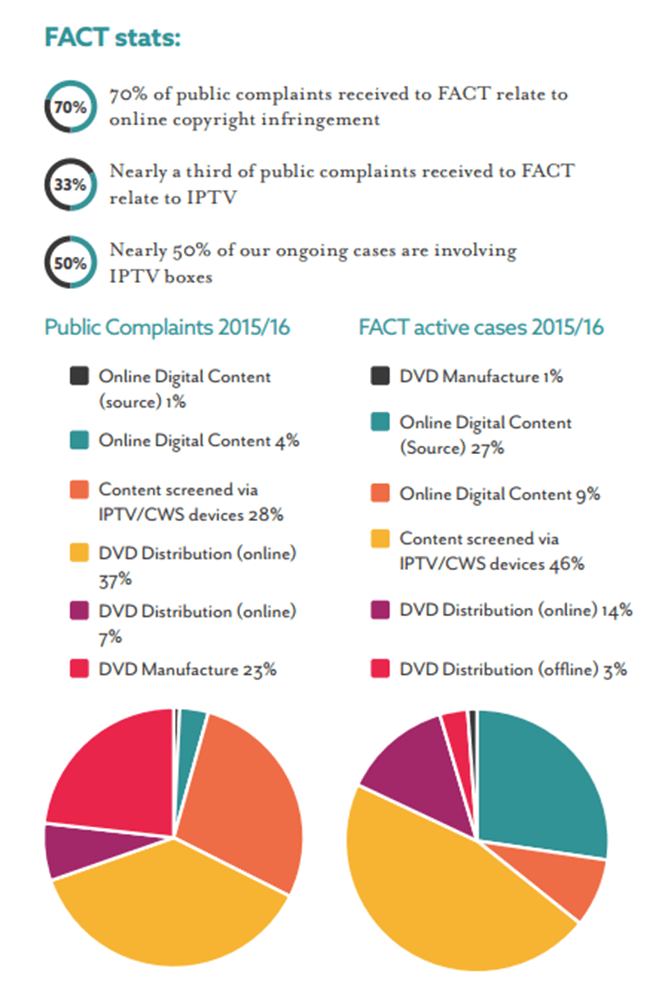
British Phonographic Industry (BPI)
In their submission to the report, the BPI cite three key areas of concern – online piracy, physical counterfeiting, and Internet-enabled sales of infringing physical content. The former is their top priority.
“The main online piracy threats to the UK recorded music industry at present come from BitTorrent networks, MP3 aggregator sites, cyberlockers, unauthorised streaming sites, stream ripping sites and pirate sites accessed via mobile devices,” the BPI writes.
“Search engines – predominantly Google – also continue to provide millions of links to infringing content and websites that are hosted by non-compliant operators and hosts that cannot be closed down have needed to be blocked in the UK under s.97A court orders (website blocking).”
The BPI notes that between January 2015 and March 2016, it submitted more than 100 million URL takedowns to Google and Bing. Counting all notices since 2011 when the BPI began the practice, the tally now sits at 200 million URLs.
“These astronomic numbers demonstrate the large quantity of infringing content that is available online and which is easily accessible to search engine users,” the BPI says.
On the web-blocking front, the BPI says it now has court orders in place to block 63 pirate sites and more than 700 related URLs, IP addresses and proxies.
“Site blocking is proving a successful strategy, and the longer the blocks are in place, the more effective they tend to be. The latest data available shows that traffic to sites blocked for over one year has reduced by an average of around 80%; with traffic to sites blocked for less than a year reduced by an average of around 50%,” the BPI adds.
Infringement warnings for Internet subscibers
The Get it Right campaign is an educational effort to advise the public on how to avoid pirate sites and spend money on genuine products. The campaign has been somewhat lukewarm thus far, but the sting in the tail has always been the threat of copyright holders sending warnings to Internet pirates.
To date, nothing has materialized on that front but hidden away on page 51 of the report is a hint that something might happen soon.
“A further component of the ‘Get it Right’ campaign is a subscriber alert programme that will, starting by the end of 2016, advise ISPs’ residential subscribers when their accounts are believed to have been used to infringe copyright,” the report reads.
“Account holders will receive an Alert from their ISP, advising them that unlawful uploading of a copyright content file may have taken place on their internet connection and offering advice on where to find legitimate sources of content.”
Overall, the tone of the report suggests a huge threat from IP crime but one that’s being effectively tackled by groups such as FACT, BPI, the Police Intellectual Property Crime Unit, and various educational initiatives. Only time will tell if next year’s report will retain the optimism.
The full report can be downloaded here (pdf)
https://torrentfreak.com/uk-ip-crime-report-2016-reveals-iptvkodi-piracy-as-growing-threat-160929/
-
After more than four weeks the extradition appeal hearings of Kim Dotcom and his former Megaupload colleagues have concluded. In his closing arguments, Dotcom's lawyer urged the court to carefully weigh the facts and give his client a "fair go," which he says the District Court failed to do. However, even if the High Court sides with the defense, the case is still far from over.
 Last December a New Zealand District Court ruled that Kim Dotcom and his colleagues can be sent to the United States to face criminal charges.
Last December a New Zealand District Court ruled that Kim Dotcom and his colleagues can be sent to the United States to face criminal charges.
This decision was immediately appealed and over the past weeksthere’s been a lengthy series of appeal hearings at New Zealand’s High Court.
Represented by a team of lawyers, Kim Dotcom and his fellow Megaupload defendants have argued that the New Zealand District Court failed to give them a fair hearing. The entire case was live-streamed on YouTube and earlier today the final arguments were presented.
Kim Dotcom’s defense lawyer Ron Mansfield repeated several claims that have been discussed over the past several weeks. He argues that the lower court made critical errors in its final ruling and that crucial evidence was overlooked or not considered at all.
One of the main arguments of the United States government is that Megaupload would only disable a URL when it received a takedown notice, not the underlying file. As a result of the deduplication technology it employed, this meant that the file could still be accessed under different URLs.
However, according to Dotcom’s defense, it was a standard practice in the Internet service provider industry to remove just the URL, something copyright holders were apparently well aware of.
“How can a copyright holder have been reasonably expecting Megaupload to take down files in response to takedown notices specifying URLs if the copyright holders knew that the prevailing industry practice was to prevent access by removing the URL, not the file,” Mansfield said.
“The use of deduplication technology by Internet service providers […] was not a secret. It was widespread within the industry and well-known both by the Internet service provider industry and the content industry,” he added.
While various stakeholders disagree on what services such as Megaupload are required to do under the DMCA, removing the URLs only was not something unique to Megaupload.
In addition, Mansfield previously cited the “Dancing Baby” case where it was held that copyright holders should consider fair use before requesting a takedown. This means that removing an underlying file down may be too broad, as fair use isn’t considered for all URLs.
Overall the defense believes that Megaupload and its employees enjoy safe harbor protection and can’t be held criminally liable for copyright infringement. As such, there is no extraditable offense.
Mr. Mansfield closes his argument by highlighting the unprecedented nature of this case, which has been ongoing for nearly five years.
“Today marks 1730 days since 20 January 2012, when the New Zealand police effectively dropped from the sky and conducted the search of Mr. Dotcom’s home. And at that point they then sought about arresting him. The officers were disguised, armed and left him and his family effectively bereft of assets and income,” Mansfield said.
Mr. Mansfield

Mansfield describes the U.S. litigation strategy as an aggressive one and argues that the failure to accept and review critical evidence deprived Kim Dotcom of a fair trial.
“Sportsmanship in a court of law is called fairness and the United States conduct has in our submission both been unlawful and unreasonable and the tactics they have adopted have been unfair and prevented Mr. Dotcom and the other appellants from having the benefit of a fair hearing.”
“He simply has not had a fair go. And we do ask that your honor considers the submissions which have been presented, because, in effect, after that period of time, after 1730 days it would be the first time there is a meaningful judicial assessment of the facts and of the submissions presented,” Mansfield concluded.
While the primary hearings are over, there are still some smaller details to work out and it is expected to take several weeks before New Zealand High Court reaches a decision. However, Kim Dotcom is confident that he’s on the winning site and congratulated his lawyers.
“I like to thank my legal team for an excellent job. My 5 children will grow up around their father thanks to your brilliance. I’m grateful,” Dotcom posted on Twitter a few hours ago.
Whatever the outcome, it’s unlikely that the case will stop at the High Court. Given the gravity of the case, both the United States and the Megaupload defendants are likely to take it all the way to the Supreme Court if the decision doesn’t go their way.
https://torrentfreak.com/kim-dotcoms-extradition-appeal-concludes-160928/
-
BitTorrent Inc. has introduced a brand new feature for its uTorrent and BitTorrent clients. 'Altruistic Mode' is aimed at people who always want to share more than they download. While this is normal behavior for many users, Altruistic Mode has a strange quirk. Once enabled, downloads using the feature may never complete. But of course, altruism isn't about receiving.
 As the name suggests, file-sharing is all about sharing. In the old days this would be achieved by having folders full of files that anyone could take. These days, with BitTorrent’s distributed nature, it’s more about sharing content and associated bandwidth.
As the name suggests, file-sharing is all about sharing. In the old days this would be achieved by having folders full of files that anyone could take. These days, with BitTorrent’s distributed nature, it’s more about sharing content and associated bandwidth.
With that in mind, good torrent etiquette dictates that one always shares at least as much as one downloads. So, if a file is 1GB in size, it’s accepted that the user should try to share 1GB back. This is known as a 1:1 ratio. Those who upload 2GB will achieve a 2:1 ratio and those aiming for 3:1 will need to upload 3GB to others.
Generally, the more people upload the healthier the swarm, so with that in mind BitTorrent Inc. has just introduced an interesting feature to new builds of their uTorrent and BitTorrent clients. It’s called Altruistic Mode and manages to be both straightforward and somewhat confusing.
Essentially, Altruistic Mode is aimed at users who want to absolutely guarantee that they are always maintaining a 2:1 ratio (2GB uploaded for every 1GB downloaded). At first view one might think that the same goal could be achieved by downloading 1GB and letting the client seed 2GB back. However, that relies on others joining the swarm later and as mentioned earlier, Altruistic Mode wants to guarantee a 2:1 ratio, not just aim for one.
So how is this achieved? Well, in normal situations torrent clients always upload as much as they can anyway, so Altruistic Mode achieves its goals by downloading less.
The initially confusing end result here is that people who enable Altruistic Mode could find that due to their client’s insistence on maintaining a 2:1 ratio, the torrent they’re downloading might never complete. It is called Altruistic Mode for a reason and when seen in that light, the importance of a finished download places second to a healthy swarm.

BitTorrent creator Bram Cohen says that the effects of Altruistic Mode on a torrent will depend on how that torrent would behave in the same swarm in regular ‘download’ mode.
– If Download Mode would upload at a greater than 2:1 ratio then an Altruistic Mode peer will have very similar behavior.
– If Download Mode would upload at a ratio between 2:1 and 1:1 then Altruistic Mode will upload less and download a lot less than Download Mode would, resulting in a 2:1 upload to download ratio.
– If Download Mode would upload at a ratio of less than 1:1 then Altruistic Mode will do very little uploading or downloading.
“The precise definition of Altruistic Mode is that it initially downloads two pieces and after that, every time it uploads two pieces worth of data it downloads one more,” Cohen explains.
“This is a simple and reliable strategy for making sure that you never get much worse than a 2:1 ratio. It results in all the behaviors described above, which do have some technical caveats….but the essential message is right in every case.”
Cohen says that a 2:1 ratio was considered a logical choice, particularly given that a 3:1 ratio or higher has the potential to impose severe restrictions on some swarms. Ironically, if too many people decide to act selflessly and turn the feature on in the same swarm, everyone’s download may never complete.
“Going for a higher number [than 2:1] could also cause swarms to no longer have a complete copy of the file if too many peers are in Altruistic Mode, which would harm not just the one peer in Altruistic Mode but other peers as well,” Cohen explains.
“Because of this, we feel that a 2:1 ratio is a sweet spot and aren’t offering any user configuration options for it. You may get ratios of greater than 2:1 in Altruistic Mode, but in those cases you could have used regular Download Mode and gotten the same results.”
For those not familiar with how BitTorrent works (and certainly many casual users), Altruistic Mode is a bit of a head-scratcher, to say the least. And, given the prospect that a download might never complete with it switched on, it seems unlikely that swarms will be inundated with clients using the mode.
Nevertheless, it’s an interesting addition to the uTorrent and Mainline BitTorrent clients and described as “an experiment” that could be further developed.
“If this goes well we may roll out another feature in the future where a peer starts out in Altruistic Mode and later switches to regular Download Mode, which would not change the upload ratio significantly but would help other peers download faster at the beginning, so peers who want to get a complete file eventually but aren’t in a rush can allow other peers who care about getting it sooner to finish first,” Cohen concludes.
Altruistic Mode is available in uTorrent 3.4.9 and above, and BitTorrent 7.9.9 and above. It is turned off by default but can be unlocked in Preferences/BitTorrent and then activated for individual torrents.
More information can be found here.
https://torrentfreak.com/utorrent-altruistic-mode-ensures-you-give-more-than-you-take-160928/


Court Asks How it Can Ban Illegal Pokemon Go Downloads
in Piracy News and Crypto Updates
Pokémon Go is not available to buy in India so the game is being heavily pirated by fans. With legal moves underway to try and bring this behavior to a halt, the Gujarat High Court is now seeking advice on how to stop downloads to protect the public interest.
While most countries don’t have a problem with Nintendo’s popular offering, others have reacted negatively after players turned up in culturally sensitive areas.
Similar issues are now causing problems in India, despite the game not being on sale there. But of course, that hasn’t stopped determined pirates from getting copies.
Over the past several months, countless people in India have been downloading illicit copies of Pokémon Go from the Internet. In the West, this has already caused copyright issues, but India’s are somewhat unique.
Public-Interest Litigation (PIL) is quite literally litigation for the protection of the public interest. One such PIL was filed last month in the Gujarat High Court against the developers of Pokémon Go. The petitioner claimed that the game hurt the religious feelings of citizens after it placed eggs in places of worship.
“To find eggs in temples of Hindus and Jains is blasphemous, and therefore my client has sought a ban on the game from the country,” petitioner Alay Anil Dave’s lawyer told the Court.
A second PIL filed with the Court by Sanjay Chaudhari claims that the game endangers public safety.
San Francisco-based developer Niantic Inc. and central and state governments are respondents in the somewhat unusual cases and all were issued with notices by the Court last week. Of course, the PILs aren’t copyright-related but the same problems persist – how can Indians be stopped from pirating and then playing the game?
That’s the question now being asked by the Gujarat High Court, which has filed a request with the state government asking for ideas on what steps can be taken to stop the game from being downloaded from the Internet.
“The division bench of Chief Justice R Subhash Reddy and Justice V M Pancholi asked the government how the downloading of the game could be stopped, after it was told that legally the game was still not available in India, yet people were downloading its pirated copy,” the report notes.
Only time will tell what solutions the state government will come up with. However, India has developed quite a reputation for broad-brush actions to stop citizens downloading illicit content from the Internet.
So-called ‘John Doe’ orders have regularly restricted access to sites including The Pirate Bay, ExtraTorrent and hundreds of other domains, so a similar response could be under consideration.
That being said, trying to stop downloads of an app that typically weighs in at just 60MB will be an entirely different matter.
There are many thousands of sites that can and do host the game, including entirely legitimate affairs such as Dropbox. Stopping the distribution of Pokémon Go in India won’t be just difficult, it will be entirely unachievable by any anti-piracy technique, or any number of techniques working in tandem.
Perhaps the only way of making a dent in this problem will be getting the developer on board to restrict where eggs appear. That would certainly make more sense than going down the blocking route and all the collateral damage that would cause.
We’ll know more about the blocking plans next week, which could provide an indication of just how far India’s courts are prepared to go when it comes to blocking illicit content online.
https://torrentfreak.com/court-asks-how-it-can-ban-illegal-pokemon-go-downloads-161006/